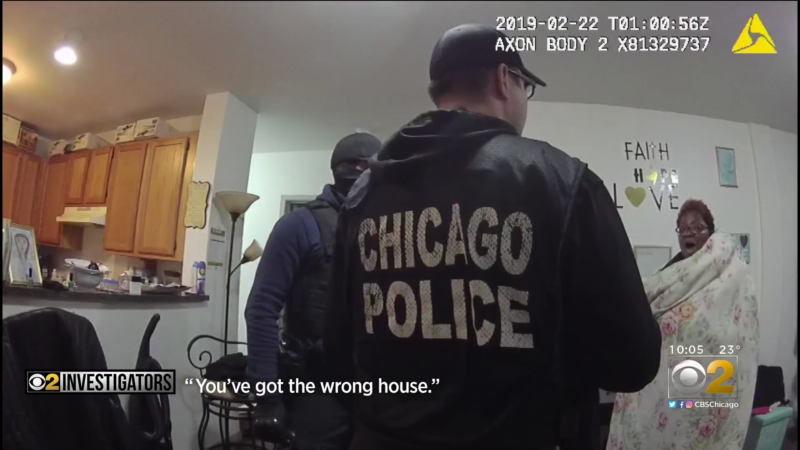Chicago Police Raided at Least 21 Wrong Houses
But poor record keeping hides the real number.

Chicago police raided the wrong house at least 21 times between 2017 and 2020, according to an inspector general report released this week, but shoddy record keeping means the true number is unknown.
The Chicago Office of Inspector General released its final report Wednesday on the Chicago Police Department's (CPD) search warrant policies, concluding that CPD's inadequate record keeping made it impossible to count or fully analyze wrong-door raids. The records the inspector general did get, however, showed that inexperience and failures to do basic investigative work contributed to botched raids.
The CPD's search warrant policies have been under scrutiny since 2020, when body camera footage was published showing officers humiliating a naked woman during a wrong-door raid in 2019. Chicago police burst into the apartment of Anjanette Young based on a faulty tip and handcuffed her while she was naked, forcing her to stand in full view of male officers as they searched her home.
Responding to the furor over Young's case, former Chicago Mayor Lori Lightfoot announced a new search warrant policy for the CPD. The city eventually settled a lawsuit filed by Young for $2.9 million.
"Chicago has learned painful lessons over the last several years about what happens when the search warrants go wrong," Chicago Inspector General Deborah Witzburg said in a press release. "The raid on the home of Anjanette Young laid bare deep deficits in CPD's policies and practices around the service of residential search warrants."
But Young was far from the only victim. Chicago-area lawyer Al Hofeld Jr. has represented 11 families in separate lawsuits who all say CPD pointed guns at their children during botched SWAT raids.
A yearslong investigation by the local news outlet CBS 2 repeatedly uncovered Chicago SWAT teams relying on unverified search warrants to ransack houses; hold families, including children, at gunpoint; and, in one case, handcuff an 8-year-old child. In another case, 17 Chicago police officers burst into a family's house with their guns drawn during a 4-year-old's birthday party. The members of one Chicago family say officers raided their house three times in four months looking for someone the residents say they don't know.
In 2018, Chicago settled another civil lawsuit by a family who claimed CPD officers stormed their house and pointed a gun at a 3-year-old girl for $2.5 million.
"The IG's findings are entirely consistent with what our office has discovered in our clients' lawsuits against the City of Chicago: sloppy, unsupervised investigations of uncorroborated tips from informants that then led to rubberstamped, search warrants for the wrong homes and resulted in serious emotional trauma to innocent families of color, including literally thousands of children over the years," Hofeld tells Reason. "And this description does not even address the way in which officers have treated and 'policed' people once they enter their homes to execute the warrant. With this kind of police work, it's no surprise at all that community trust has been and remains CPD's biggest challenge."
In one lawsuit filed by Jasmine Vale and her family in 2020, Vale claimed that CPD trained their guns on a grandmother and child, screamed obscenities at them, and ransacked their house, causing thousands of dollars in damage. The lawsuit said the search warrant was based on a tip from an anonymous informant that the grandmother's son possessed an unlicensed handgun. Chicago police never bothered to learn that the son had moved to California several years ago.
The number of residential search warrants executed by CPD has dropped sharply since 2019. In years prior, CPD was serving more than 1,000 search warrants a year. In both 2020 and 2021, it served fewer than 200.
However, the report praises CPD for taking "encouraging steps toward increased accountability" by drafting revisions this January to its search warrant policies, including a newly proposed electronic data application that could significantly improve record keeping.
In a statement to the Chicago Sun-Times, the CPD noted that the inspector general report only studied residential search warrants until 2021. "Since that time, CPD has made numerous revisions to policy and training, including greater supervision and accountability within the process of search warrant development and service," CPD said. "Following search warrants that are identified as wrong raids, the department conducts critical incident after-action reviews."


Show Comments (32)